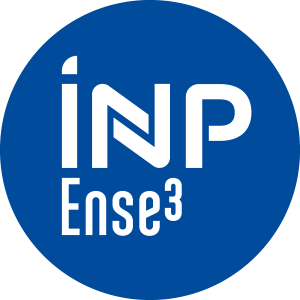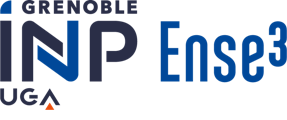Number of hours
- Lectures 26.0
- Projects -
- Tutorials -
- Internship -
- Laboratory works 34.0
- Written tests -
ECTS
ECTS 5.0
Goal(s)
Robots are rapidly evolving from physically bounded to their work-cells, to increasingly complex machines capable of performing challenging tasks. The objective of this course is to provide the basic concepts and algorithms required to develop mobile robots that can act and evolve autonomously in complex environments.
The course will focus on the kinematics and control of mobile robots, the environment perception, probabilistic localization and mapping, as well as movement planning. The courses and exercises of this course present several types of robots such as wheeled robots, leg robots and drones. Practical work will be performed with drones.
Ahmad HABLY
Content(s)
The course will be divided into 5 main parts:
1.Introduction, context, issues, markets, use, platforms, manufacturers (CM 2 hrs)
2.Modeling (mobile and Aerial robots)(CM 4 hrs ; BE 2 hrs)
a.Basis of rigid body representation in the 3D space
b.The different types of robots and drones
c.A first basic modeling
d.Advanced elements for the case of quadrotors
e.Computer session on the modelling of drones (BE 2hrs)
3.Perception for robots (CM 6 hrs)
a.Inertial and magnetic measurements (magneto, gyro, accelero), inertial/attitude units, barometer and encoder/odometer (CM 4hrs)
b.Depth sensors (sonar, infrared, lidar, ...) and vision (optical flow, mono, stereo) (CM 2hrs)
4.State estimation – localization – mapping (CM 10 hrs ; TP 4hrs)
a.Multi-sensor fusion for inertial/magnetic navigation via static and dynamic state estimation (Least squares algorithms, gradient algorithms, observers, Kalman filter, complementary filter, etc.) (CM 6 hrs)
b.Lab on attitude estimation (for example) with Matlab (simulated or real data) (BE 4 hrs)
c.Introduction to the localization problem and mapping (discrete Bayesian filter, particle filters, scan matching) (CM 2 hrs)
d.Detection of motion, detection of moving objects, tracking of moving objects (Olivier CM 2 hrs)
5.Control for robots
a.Trim control (CM 2hr)
b.Hovering flight (CM 2hr)
c.Trajectory generation and control (CM 2hr)
d.Multiple UAVs control (CM 2hr)
e.Computer session on the control of drones (Nicolas BE 8 hrs)
f.PID controller + Implementation and tests on robair (Olivier TP 4hrs)
6.ROS (TP 12hrs)
a.Introduction to ros
b.Using ROS with a mobile robot (laser data acquisition + control of mobile robot)
c.Detection/tracking of moving objects with a laser scanner
d.Localization – mapping with a mobile robot
control, programming language
Session 1
Continuous assessment (CC1) : average of lab reports about ROS, estimation techniques and drone control.
Final exam (ET1) : 1 hour supervised written exam
Session 2
Continous assessment : the CC1 mark is transferred to session 2 and cannot be retaken (CC1=CC2)
Final exam : new assessment (ET2) to replace session 1 assessment (ET1)
The exam is given in english only 
The course exists in the following branches:
- Curriculum - Master's Degree in Engineering ASI - Semester 9 (this course is given in english only
 )
) - Curriculum - Master inter MARS - Semester 9 (this course is given in english only
 )
)
Course ID : WEUMROB0
Course language(s): 
You can find this course among all other courses.



